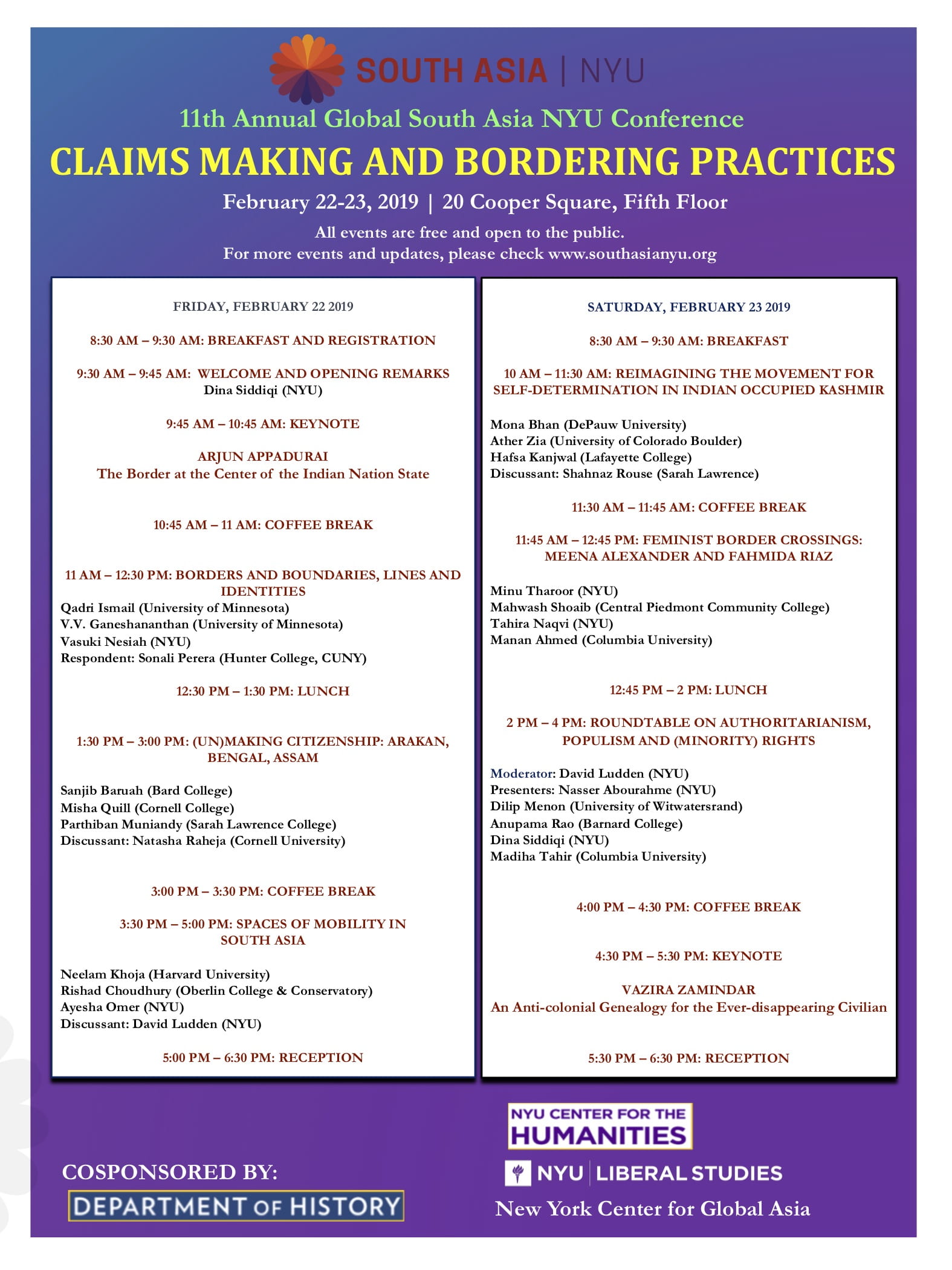The 11th Annual Global South Asia Conference runs all day Feb 22-23 at 20 Cooper Square, 5th Floor.
Come one and Come ALL !!
Conference Theme: “Claims Making and Bordering Practices.”
The Global Asia Panel: 3:30-5:00 on Friday Feb 22, followed by reception
Panel Title: “Spaces of Mobility in South Asia”
Panelists: Neelam Khoja (Harvard), Ayesha Omer (NYU), Rishad Choudhury (Oberlin)
Neelam Khoja, “Claiming Qandahar, Claiming Sovereignty: How Iranian and Afghan Warlords Legitimized Emerging Empires in Early Modern Iran and Hindustan”
Abstract: Safavids, Mughals, Afghans, and Nadirids attempted to conquer and control Qandahar throughout the early modern period. Qandahar, one of the oldest inhabited fortified cities in the region, was a strategic city for long-distance overland trade. It served as a port of entry to both Iran, to the west, and Hindustan, to the east. In the eighteenth century, conquering Qandahar was a requirement for claiming sovereignty. The Ghilzai Afghans managed to govern as an autonomous empire after successfully controlling Qandahar. It was only after ousting these Ghilzai Afghans that Nadir Shah was empowered enough to try his luck in Hindustan. Likewise, Ahmad Shah Abdali-Durrani’s claim as emperor was taken seriously only after he subjugated Qandahar, which became the capital of his empire. This paper examines eighteenth century primary sources in order to trace how emerging emperors legitimized their sovereign claims and its relation to Qandahar’s occupation.
Ayesha Omer, “Digital Connections on the New Silk Road: A Study of the Pak-China Fiber Optic Cable”
Abstract: This paper follows an overland fiber optic cable from China’s Xinjiang region across the disputed territories of Gilgit-Baltistan to the Pakistani capital of Islamabad, as part of China’s global New Silk Road project. It charts the formation of this global digital media infrastructure on the ground of glaciers and mountains of the Himalayas and the situated social histories of Gilgit-Baltistan. This paper takes up the ground, not as an a priori condition, but as a political substrate that inflects the mediation of technological infrastructures as well as conditions of possibility of lifeworlds in Gilgit-Baltistan. Combining ethnographic and archival research, this paper draws on media studies, infrastructure studies, and theories of governmentality to support its arguments.
Rishad Choudhury, “Pilgrim Passages: Tradition and Transition in the South Asian Hajj.”
Abstract: Reading hajj narratives against political-administrative archives, this article elaborates a global microhistory of how the Meccan pilgrimage afforded new horizons of Muslim engagement as the Mughal and Ottoman empires declined and decentralized to give way to European hegemony (c. 1750-1830). It is argued that the sacred sites of Arabia acquired novel meaning for Indian pilgrims seeking a mirror for moral and political regeneration at home. At the same time, the turbulence of imperial transformations induced greater willingness to come to grips with the realities of votive travel, and in turn greater recognition of perceived differences between global Muslim cultures encountered on hajj. Hajj accounts thus signaled a radical break from classical genres, wherein objective experiences were subordinated to the immanent. Recovering the itineraries of Rafi‘-ud-Din Muradabadi (1721/22-1810), a north Indian Sunni scholar who journeyed by sea, and ‘Abdul Husain Karnataki (d. 1830), a southern Indian Shi‘a royal who traveled overland to the Hijaz, the essay observes that, conceived in the shadow of regime change in India and the Indian Ocean, their reflections anticipated essential modern trends in Muslim mobility. These included discrete distinctions between its religious and irreligious entailments, and an emergent episteme that further illuminates how the Muslim world was reimagined after the Muslim empires.
“But, reaching the Ka‘ba brought a lifelong desire to life.”
– Rafi‘-ud-Din Faruqi Muradabadi (1787)

Aw, this was an exceptionally nice post. Finding the time and actual effort to create a great article… but what can I say… I procrastinate a lot and don’t manage to get anything done.|
That is really interesting, You’re an overly skilled blogger. I have joined your feed and look ahead to in the hunt for extra of your magnificent post. Additionally, I have shared your web site in my social networks!
Hello, i think that i noticed you visited my site thus i return the favor?I’m trying to in finding things to enhance my web site!I guess its ok to make use of a few of your ideas!!
I’m really loving the theme/design of your weblog. Do you ever run into any web browser compatibility problems? A small number of my blog visitors have complained about my site not working correctly in Explorer but looks great in Firefox. Do you have any ideas to help fix this problem?
Like!! Great article post.Really thank you! Really Cool.
Hello I think the admin of this site is in fact working hard for his website, since here every stuff is quality based information. grazie
hi, your post is amazing.Following your site.
Awsome blog! I am loving it!! Will come back again. I am taking your feeds also